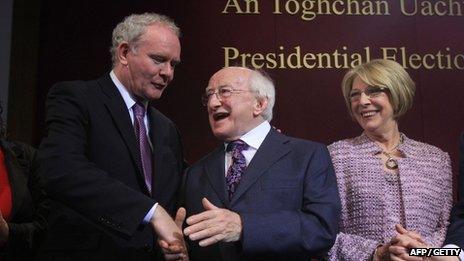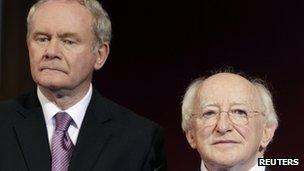Martin McGuinness faces life without the presidency
- Published
- comments

Martin McGuinness came third in the race for the Aras
Martina Purdy, standing in for Mark Devenport, looks at where the Irish presidential election result leaves Martin McGuinness.
"I don't think Martin has lost an election," said Sinn Fein's Conor Murphy, speaking on BBC Radio Ulster about the Republic of Ireland presidential election result. "Not that I can recall," he quickly added.
Indeed, one has to go back quite a few years to recall a defeat for Martin McGuinness. But he has indeed lost elections before.
He lost three Westminster elections between 1983 and 1992 to the SDLP's John Hume in Foyle, consistently coming third behind Mr Hume and the DUP's Gregory Campbell. His luck changed with the peace process when he moved to Mid-Ulster and defeated the DUP's William McCrea to become an MP in 1997.
The fact that Conor Murphy struggled to recall those failures is an indication of how successful Sinn Fein has become.
And despite his description of the result as "good," the party can only be disappointed that one of its most talented politicians came third in the race at the weekend. It was good, but not great, as some commentators put it.
Of course Martin McGuinness did not need to win. He just needed to lose well. And by those standards he just about hits the mark.
Sinn Fein can say that Mr McGuinness added another few points onto Sinn Fein's record result of 9.9% in the last general election, and beat Fine Gael's Gay Mitchell, candidate for the largest party in the Republic.
The 13.7% tally however was on the low side, given that Mary Lou McDonald the party president suggested Sinn Fein was looking at between 14% and 18%. It must also have been disappointing given that some polls put him on 20% and the bookies, early in the race, slashed his odds to 3 to one favourite.
In the end, the bookies called it right - even paying out early on winner Michael D Higgins - days before Mr McGuinness's question to Sean Gallagher on RTE's Frontline, widely credited with ruining Mr Gallagher's chances of victory. Still, Sinn Fein took pride in "slaying the Dragon's Den dragon."
It was always a gamble putting Mr McGuinness in the race, and some sources suggest he was reluctant and only agreed to stand under pressure from a party that saw an opportunity, without a Fianna Fail candidate, in the race.
Indeed speaking on Inside Politics back in September, he answered that he was a "party loyalist" when asked about speculation he was going to stand.
When McGuinness entered the race, he took a leave of absence from his deputy first minister's job, with a ringing endorsement from a Presbyterian minister, the Reverend David Latimer, describing him as "one of the great leaders of our times".
Most of the Republic's voters begged to differ. Just as Conor Murphy had forgotten old McGuinness election defeats, one wonders if Sinn Fein under-estimated the extent to which Martin McGuinness's IRA past would figure in the campaign. T
he issue could have been handled better as early claims of leaving the IRA in 1974 must surely have undermined Mr McGuinness's credibility.
So does he return a diminished, wounded figure?
It depends on one's point of view.
Denials and doubts
Sinn Fein supporters will think no less of him, and are more likely to blame the Dublin media than any fault on McGuinness's part. Also, McGuinness did build some results for Sinn Fein, gaining ground in constituencies where Sinn Fein had not stood before and Mr Murphy pointed to 1,500 new members.

'Sinn Fein will learn lessons from the race and move on to the next one'
The DUP will take quiet satisfaction that the Republic's electorate firmly rejected a Sinn Fein president with an IRA past.
However their members, out of loyalty to their partners in government, will keep their views to themselves.
The same cannot be said for the SDLP and the Ulster Unionists who have cast a critical eye over the result.
The SDLP's Alex Attwood, minister for the environment, acknowledged Mr McGuinness had done well in the election, but added: "(He) returns north with a shadow over him of questions unanswered of denials and doubts and that will be with him and with Sinn Fein and with the IRA for a long time to come."
The issue of victims will be revisited perhaps with renewed vigour. And those that opposed him will take comfort that the he did not win.
Even so, Martin McGuinness did make some modest gains. Still, knowing what he does now, would he have thought twice about standing in an election which saw his past raked over, and some rather excruciating encounters with IRA victims?
Not to mention the horrific pictures of IRA murder victim Frank Hegarty published in the Irish Mail on Sunday.
He has spoken of dark days and is clearly happy - elated even - that the Troubles are over. But this election was a reminder that not everyone has been able to move on.
Sinn Fein will learn lessons from the race and move on to the next one, with perhaps a shiny new Shinner with no IRA baggage. Mary Lou McDonald?
And in the meantime, Sinn Fein will continue to demand votes for Irish citizens who live beyond the border.
One lesson was the great divide between north and south, a divide that exists even in countries that are not partitioned. Dana said that southerners looked north and saw a border while northerners looked south and didn't see a border.
A majority of northern nationalists look at Martin McGuinness and see a peacemaker. Do most southern nationalists still see a paramilitary?
Martin McGuinness left the count smiling, and was gracious about the result.
And he's clearly an optimist. Speaking to Tara Mills on the Politics Show, he seemed to take comfort that he could return to Stormont, where he is regarded more as peacemaker than paramilitary. "Isn't it very fortunate for me that I have something to do?" he said.